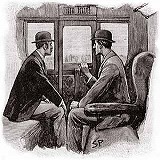“There is nothing in which deduction is so necessary as in religion,” said he, leaning with his back against the shutters. “It can be built up as an exact science by the reasoner. Our highest assurance of the goodness of Providence seems to me to rest in the flowers. All other things, our powers, our desires, our food, are all really necessary for our existence in the first instance. But this rose is an extra. Its smell and its colour are an embellishment of life, not a condition of it. It is only goodness which gives extras, and so I say again that we have much to hope from the flowers.”
Percy Phelps and his nurse looked at Holmes during this demonstration with surprise and a good deal of disappointment written upon their faces. He had fallen into a reverie, with the moss-rose between his fingers. It had lasted some minutes before the young lady broke in upon it.
“Do you see any prospect of solving this mystery, Mr. Holmes?” she asked with a touch of asperity in her voice.
“Oh, the mystery!” he answered, coming back with a start to the realities of life. “Well, it would be absurd to deny that the case is a very abstruse and complicated one, but I can promise you that I will look into the matter and let you know any points which may strike me.”
“Do you see any clue?”
“You have furnished me with seven, but of course I must test them before I can pronounce upon their value.”
“You suspect someone?”
“I suspect myself.”
“What!”
“Of coming to conclusions too rapidly.”
“Then go to London and test your conclusions.”
“Your advice is very excellent, Miss Harrison,” said Holmes, rising. “I think, Watson, we cannot do better. Do not allow yourself to indulge in false hopes, Mr. Phelps. The affair is a very tangled one.”
“I shall be in a fever until I see you again,” cried the diplomatist.
“Well, I’ll come out by the same train to-morrow, though it’s more than likely that my report will be a negative one.”
“God bless you for promising to come,” cried our client. “It gives me fresh life to know that something is being done. By the way, I have had a letter from Lord Holdhurst.”
“Ha! what did he say?”
“He was cold, but not harsh. I dare say my severe illness prevented him from being that. He repeated that the matter was of the utmost importance, and added that no steps would be taken about my future - by which he means, of course, my dismissal - until my health was restored and I had an opportunity of repairing my misfortune.”
“Well, that was reasonable and considerate,” said Holmes. “Come, Watson, for we have a good day’s work before us in town.”
Mr. Joseph Harrison drove us down to the station, and we were soon whirling up in a Portsmouth train. Holmes was sunk in profound thought and hardly opened his mouth until we had passed Clapham Junction.
“It’s a very cheery thing to come into London by any of these lines which run high and allow you to look down upon the houses like this.”

I thought he was joking, for the view was sordid enough, but he soon explained himself.
“Look at those big, isolated clumps of buildings rising up above the slates, like brick islands in a lead-coloured sea.”
“The board-schools.”
“Light-houses, my boy! Beacons of the future! Capsules with hundreds of bright little seeds in each, out of which will spring the wiser, better England of the future. I suppose that man Phelps does not drink?”
“I should not think so.”
“Nor should I, but we are bound to take every possibility into account. The poor devil has certainly got himself into very deep water, and it’s a question whether we shall ever be able to get him ashore. What do you think of Miss Harrison?”